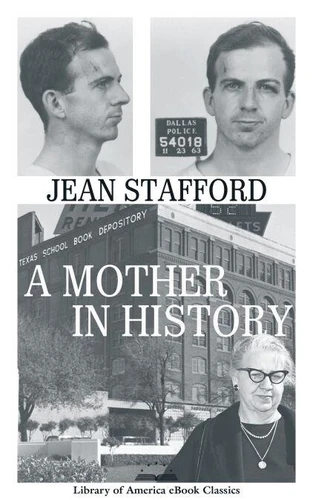A Mother in History
Par :Formats :
Disponible dans votre compte client Decitre ou Furet du Nord dès validation de votre commande. Le format ePub protégé est :
- Compatible avec une lecture sur My Vivlio (smartphone, tablette, ordinateur)
- Compatible avec une lecture sur liseuses Vivlio
- Pour les liseuses autres que Vivlio, vous devez utiliser le logiciel Adobe Digital Edition. Non compatible avec la lecture sur les liseuses Kindle, Remarkable et Sony
- Non compatible avec un achat hors France métropolitaine
 , qui est-ce ?
, qui est-ce ?Notre partenaire de plateforme de lecture numérique où vous retrouverez l'ensemble de vos ebooks gratuitement
Pour en savoir plus sur nos ebooks, consultez notre aide en ligne ici
- Nombre de pages50
- FormatePub
- ISBN978-1-59853-695-9
- EAN9781598536959
- Date de parution04/05/2021
- Protection num.Adobe DRM
- Taille598 Ko
- Infos supplémentairesepub
- ÉditeurLibrary of America
Résumé
Jean Stafford's unforgettable portrait of Marguerite Oswald, the mother of Lee Harvey Oswald. Curious about "the influences and accidents and loves and antipathies and idiosyncrasies" that shaped Lee Harvey Oswald, the novelist and short story writer Jean Stafford spent nine hours interviewing Marguerite Oswald in May 1965. A Mother in History (1966) is the acerbic result, an indelible portrait of a woman hungry for money, fame, and attention, full of righteous self-pity, and relentless in professing her son's blamelessness: "Killing does not necessarily mean badness.
You find killing in some very fine homes for one reason or another." Stafford's controversial profile elicited mixed reviews-Newsweek praised it as a "masterpiece of character study, " while Time called it "the most abrasively unpleasant book in recent years"-and angry readers accused her of seeking to "enthrone a wicked woman" and "demolish the sacred throne of motherhood." It captures a moment in history when the trauma of Dallas was still raw, Lee Harvey Oswald's guilt was widely accepted, and Marguerite Oswald, with her obsessive "research" into hidden "truths" and the machinations of an omnipresent "they, " appeared to be a singular prisoner of maternal delusion, and not a harbinger of the decades to come.
You find killing in some very fine homes for one reason or another." Stafford's controversial profile elicited mixed reviews-Newsweek praised it as a "masterpiece of character study, " while Time called it "the most abrasively unpleasant book in recent years"-and angry readers accused her of seeking to "enthrone a wicked woman" and "demolish the sacred throne of motherhood." It captures a moment in history when the trauma of Dallas was still raw, Lee Harvey Oswald's guilt was widely accepted, and Marguerite Oswald, with her obsessive "research" into hidden "truths" and the machinations of an omnipresent "they, " appeared to be a singular prisoner of maternal delusion, and not a harbinger of the decades to come.
Jean Stafford's unforgettable portrait of Marguerite Oswald, the mother of Lee Harvey Oswald. Curious about "the influences and accidents and loves and antipathies and idiosyncrasies" that shaped Lee Harvey Oswald, the novelist and short story writer Jean Stafford spent nine hours interviewing Marguerite Oswald in May 1965. A Mother in History (1966) is the acerbic result, an indelible portrait of a woman hungry for money, fame, and attention, full of righteous self-pity, and relentless in professing her son's blamelessness: "Killing does not necessarily mean badness.
You find killing in some very fine homes for one reason or another." Stafford's controversial profile elicited mixed reviews-Newsweek praised it as a "masterpiece of character study, " while Time called it "the most abrasively unpleasant book in recent years"-and angry readers accused her of seeking to "enthrone a wicked woman" and "demolish the sacred throne of motherhood." It captures a moment in history when the trauma of Dallas was still raw, Lee Harvey Oswald's guilt was widely accepted, and Marguerite Oswald, with her obsessive "research" into hidden "truths" and the machinations of an omnipresent "they, " appeared to be a singular prisoner of maternal delusion, and not a harbinger of the decades to come.
You find killing in some very fine homes for one reason or another." Stafford's controversial profile elicited mixed reviews-Newsweek praised it as a "masterpiece of character study, " while Time called it "the most abrasively unpleasant book in recent years"-and angry readers accused her of seeking to "enthrone a wicked woman" and "demolish the sacred throne of motherhood." It captures a moment in history when the trauma of Dallas was still raw, Lee Harvey Oswald's guilt was widely accepted, and Marguerite Oswald, with her obsessive "research" into hidden "truths" and the machinations of an omnipresent "they, " appeared to be a singular prisoner of maternal delusion, and not a harbinger of the decades to come.








